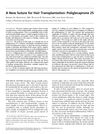TLDR Hair restoration surgery can have complications; success depends on patient education, careful planning, and proper execution.
The article discusses the potential complications that can arise from hair restoration surgery, including scar-related problems, bleeding, infection, edema, donor-site depletion, and more. The document provides information on the causes of these complications and strategies for prevention and management. The article emphasizes the importance of preoperative education and active patient participation to ensure a successful, problem-free restoration of hair. The document also highlights the importance of proper patient selection, a strategic operative plan, and careful execution of the restorative procedure to minimize complications.
 2 citations
,
May 2010 in “Hair transplant forum international”
2 citations
,
May 2010 in “Hair transplant forum international” Different hair restoration techniques like follicular unit extraction, scalp reduction, and body hair transplantation can improve results for patients unhappy with their initial surgery, but they also have potential risks.
 1 citations
,
March 2009 in “Hair transplant forum international”
1 citations
,
March 2009 in “Hair transplant forum international” The author believes that in hair restoration, creating an illusion of coverage is more important than perfection, and managing expectations and improving average results should be prioritized over promising unrealistic outcomes.
7 citations
,
July 2008 in “Hair transplant forum international” Strict infection control is crucial for safe and successful hair restoration.
 11 citations
,
November 2005 in “Hair transplant forum international”
11 citations
,
November 2005 in “Hair transplant forum international” The document provides a method to avoid sudden hair loss after a hair transplant.
 2 citations
,
October 1997 in “Dermatologic Clinics”
2 citations
,
October 1997 in “Dermatologic Clinics” The document concludes that advancements in hair restoration surgery have led to more natural results and patient satisfaction, with hope for future improvements in treatment.
 2 citations
,
January 2001 in “Dermatologic Surgery”
2 citations
,
January 2001 in “Dermatologic Surgery” Poliglecaprone 25 is better than steel staples for hair transplant surgery, causing less discomfort and finer scars.

Using calvarial bone for maxilla augmentation is less painful and allows for single-procedure dental implants.
 August 2016 in “InTech eBooks”
August 2016 in “InTech eBooks” Esthetic surgery complications can include infections, nerve injury, and more; proper evaluation and technique help prevent them.
 4 citations
,
January 2005 in “Elsevier eBooks”
4 citations
,
January 2005 in “Elsevier eBooks” Follicular Unit Transplantation is a precise hair restoration technique that requires careful planning and a skilled team, and Follicular Unit Extraction offers a less invasive option.









